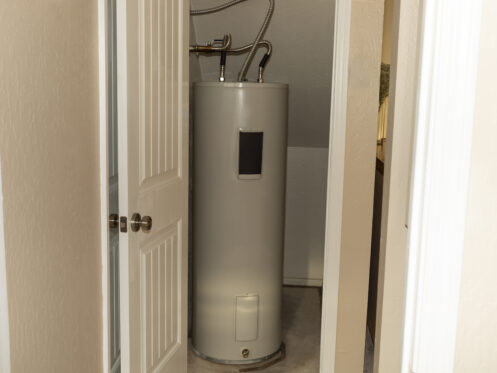Water heaters serve a vital function in homes. They are responsible for heating cold water and circulating it throughout your home. However, all water heaters are not the same. There are two types of water heaters – tank and tankless. The type you choose should depend on a variety of factors. Both perform the same function, but there are some key differences to keep in mind when deciding between one or the other. Considering these factors can help you make a sound decision.
How Do Water Heaters Work?
Tank water heaters can usually hold between 30 and 60 gallons of water. Most, however, are capable of holding 50 gallons. The amount of water your water heater can hold should depend on how much hot water your household uses. Tank water heaters use electricity, natural gas, propane, or oil to heat water to the desired temperature when necessary. Hot water is always present in the tank and ready to be dispersed through pipes to the appropriate location. Tank water heaters are usually installed in a utility closet, basement, attic, or garage.
A tankless water heater, also known as an on-demand water heater, does not store water in its tank. The water is heated as it passes through the water heater. The water heater then uses a heat exchanger to make the water hot. Like tank water heaters, tankless water heaters can run on electricity, propane, or natural gas. Since they only heat water when needed, there is no loss of standby energy, so you can save on your energy bills. Tankless water heaters are typically mounted on the wall, saving you space.
Benefits of Tank Water Heaters
Tank water heaters are also easier to install because their connections are relatively simple. Most plumbers can quickly install a tank water heater with minimal effort. The process for installing tank water heaters is not as complex as the process needed to install a tankless water heater. Typically, they do not need a complicated venting system, which also reduces the cost of installation. Tank water heaters are easier to find and buy because they are still the most common type of water heater.
Benefits of Tankless Water Heaters
Tankless water heaters allow you access to a constant hot water supply, so you won’t have to worry about running out. Energy efficiency is another benefit of tankless water heaters. They use less energy because they only heat water when needed. This can help you save money on your utility bills in the long run. They also have a relatively long life span of up to 20 years or more. Your tankless water heater’s life span will depend heavily on how well it is maintained.
Tankless water heaters do not take up much space and can be installed in almost any location. They don’t require a lot of maintenance, and there is no need for sporadic flushing. They are also less likely to spring a leak.
Cons of Tank Water Heaters
Tank water heaters aren’t perfect, so everyone won’t benefit from installing one. Some of the cons of tank water heaters include:
- Higher energy costs
- Wait time for hot water
- Limited hot water (water can run out easily)
- Short life span
- Takes up more space
- Potential for leaks
Cons of Tankless Water Heaters
Despite their convenience, there are some drawbacks to installing a tankless water heater. Some of the cons of tankless water heaters include:
- More expensive to buy and install
- May need to reconfigure plumbing to install
- Can’t provide hot water faster than it can heat it
- Limited flow rate
- May need multiple water heaters in larger homes
Factors to Consider Before Choosing a Water Heater
Plumbing System
Before you choose between a tankless or tank water heater, you must take your plumbing system into consideration. You will want to factor in the size of your household and how much hot water you will probably need. The shape and size of your pipes may also be better suited for one option than the other. Lastly, you will want to consider your budget. Both types of water heaters can be a good investment. This is especially true if you choose one that meets your family’s needs.
Home Resell Value
The type of water heater you choose can also have an impact on your home’s resell value. Homes with tankless water heaters are seen as more desirable, so they tend to command higher prices than homes with tank water heaters. Buyers are often attracted to their energy efficiency, which translates to savings on their utility bills. If you are thinking of selling your home, you may be able to sell it faster if you install a tankless water heater. The value added to your home will depend on various factors such as the current real estate market.
Environmental Impact
Many homeowners only focus on the costs associated with the purchase, operation, and installation of their water heater. This is to be expected, but there are a few other factors to consider when choosing between a tank and a tankless water heater. If you are concerned about the environment, tankless water heaters will almost always leave a smaller carbon footprint. Since they use less energy, they are better for the environment.
Rate of Hot Water Delivery
A standard tank water heater can produce up to 80 gallons of hot water per hour. This means they can produce hot water at a relatively fast rate but usually not as fast as tankless heaters. The amount of time it takes for a plumbing fixture to receive hot water will depend on factors such as the configuration of your plumbing, the distance between the water heater and the plumbing fixture, and the size of your home.
When choosing a water heater, keep the location in mind. You won’t receive hot water immediately, so no matter what type of heater you choose, you will need to be somewhat patient. If it is far away from its point of delivery, it can take a tankless water heater just as long to heat up water.
Maintenance
No matter what type of water heater you choose, you will need to consider maintenance. A properly maintained water heater will be able to do its job more effectively and efficiently. Tank water heaters should be flushed and cleaned at least once a year. Neglecting to do this will allow sediment to accumulate at the bottom of the tank. You should clean your tankless water heater by cleaning the inlet filter as well as descaling and flushing it. A professional should also periodically inspect your tankless water heater to ensure it works properly. In short, tank and tankless water heaters require almost the same type and amount of maintenance.
Tank vs. Tankless
In essence, the type of water heater you choose should depend on your household’s needs, the configuration of your plumbing, and the layout of your home. Depending on these factors, one may be a better fit than the other. If you can’t decide which type to install in your home, contact a plumbing professional at Air Control Home Services in Lake Havasu City. We offer affordable and professional plumbing services to area homeowners.






